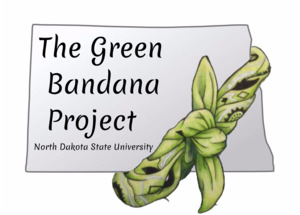
The Green Bandana Project
The Green Bandana Project creates a visual support system around campus for anyone struggling with anxiety or depression. The bandanas are attached to student’s backpacks when they have pledged to be a safe individual to approach with mental health- related issues and that they know where resources are. The green bandana is a sign of quiet solidarity.
Get Involved
Training 1: Learn about the Green Bandana Project and take the pledge of support:
- Thursday, March 21 at 12pm in Memorial Union's Nueta Room
- Monday, April 15 at 6pm in Cater Hall's Multi-Purpose Room
Training 2: After you have attended the initial training, dig deeper into supporting students by learning about hard conversations and how to have them. Special guest, Betsy Carter from the NDSU Counseling Center.
- Monday, March 18 at 12pm in Memorial Union's Sahnish Room
Pledge
In taking this bandana and tying it to my backpack, I pledge:
- I will listen if you need to talk to someone
- I will talk to someone if I need to be listened to
- I will help you find someone to talk to when you need more support
- I will find someone to talk to when I need more support
- I will be accepting
- I will be honest
- I will see a person in need of support and not just their challenges
With this pledge, I am committing support for those dealing with depression and/or anxiety
- You can talk with me, I want to help
- You are way too important to feel alone today
Questions
Contact Kennedy Copiskey at Kennedy.Copiskey@ndsu.edu with questions.
AVAILABLE RESOURCES
NDSU
FIRST LINK
FirstLink is a free, confidential service available to anyone 24/7/365 for listening and support, referrals to resources/help and crisis intervention. FirstLink answers the 211 help line, the National Suicide Prevention Lifeline and communicates via Text line 898-211. FirstLink provides these services across the entire state of North Dakota and parts of Minnesota. Dial 2-1-1 or text your zipcode to 898-211 from anywhere in our service area for confidential help and support.
NDSU CARE TEAM
The Care Team is a collaborative interdisciplinary team of campus-community members that meets weekly to discuss students exhibiting behaviors indicative of crisis and elevated risk, as well as students who may need additional assistance and support to navigate challenges and experience success.
NDSU COUNSELING CENTER
The NDSU Counseling Center provides a confidential setting in which students may explore concerns of a personal or academic nature; makes referrals; and serves as consultants for faculty and staff. Students in counseling can explore a variety of concerns which may prevent them from functioning at their optimum levels.
NDSU POLICE
To provide professional services and resources to help the campus be a safe and secure place to live, learn, work and visit, while being prepared to respond to the emergency services needs of the campus community.
SNAP THE STIGMA
Lived experiences of mental illness through photography. Normalizing, de-stigmatizing and humanizing mental health issues through photography and shared lived experiences.
NDSU STUDENT HEALTH SERVICE
Student Health Services (SHS) is an on campus fully functioning clinic and pharmacy for the NDSU community.
NATIONAL
NATIONAL SUICIDE PREVENTION LIFELINE
The Lifeline is a free, confidential crisis hotline that is available to everyone 24 hours a day, seven days a week.
CRISIS TEXT LINE
The Crisis Text hotline is available 24 hours a day, seven days a week throughout the U.S. The Crisis Text Line serves anyone, in any type of crisis, connecting them with a crisis counselor who can provide support and information.
VETERANS CRISIS LINE
The Veterans Crisis Line is a free, confidential resource that connects veterans 24 hours a day, seven days a week with a trained responder.
DISASTER DISTRESS HELPLINE
The disaster distress helpline provides immediate crisis counseling for people who are experiencing emotional distress related to any natural or human-caused disaster. The helpline is free, multilingual, confidential, and available 24 hours a day, seven days a week.
THE TREVOR PROJECT FOR LGBTQ+ INDIVIDUALS
A national 24-hour, toll free confidential suicide hotline for LGBTQ youth.
RAINN SEXUAL ASSAULT HOTLINE
Get connected with a trained staff member from a sexual assault service provider in your area. Hotline available 24 hours a day, seven days a week.
SUBSTANCE ABUSE & MENTAL HEALTH HOTLINE
SAMHSA’s National Helpline is a free, confidential, 24/7, 365-day-a-year treatment referral and information service (in English and Spanish) for individuals and families facing mental and/or substance use disorders.
NATIONAL DOMESTIC VIOLENCE HOTLINE
The National Domestic Violence Hotline provides essential tools and support to help survivors of domestic violence so they can live their lives free of abuse, 24 hours a day, seven days a week, 365 days a year.
NAMI HELPLINE
The NAMI HelpLine is a free service that provides information, referrals and support to people living with a mental health condition, family members and caregivers, mental health providers and the public.
2-1-1 BY THE UNITED WAY
If you need assistance finding food, paying for housing bills, accessing free childcare, or other essential services, visit 211.org or dial 211 to speak to someone who can help.
History/ Other Participating Institutions
At the Midwest Affiliate of College and University Residence Halls (MACURH) Annual Leadership Conference in 2019, students from the NDSU Delegation had the opportunity to attend a presentation on mental health awareness and support on campus. Inspired by the topics presented, NDSU students Halie Van Vleet and Jenna Saatoff, decided to bring the Green Bandana Project back to campus.
The Bandana Project is an active program at campuses across the nation. The Bandana Project began at UW- River Falls in 2014 as an outreach campaign that also commemorates the life of Daniel Gerbec, a college student whose quiet suffering caused him to take his own life in September of 2012. Since the campaigns start, more campuses have made their own versions and implemented their own stories. https://www.uwrf.edu/BIOL/Dan-s-Bandana-Project.cf


